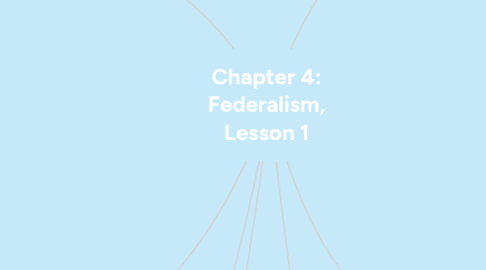Chapter 4: Federalism, Lesson 1
by Eslyn Jaime


1. National Powers
1.1. The Constitution grants both expressed powers and implied powers to the national government.
1.2. 1. Delegated powers
1.2.1. Powers the Constitution grants or delegates to the national government.
1.3. 2. The expressed powers, also called enumerated powers.
1.3.1. Are those powers directly expressed or stated in the Constitution by the Founders. these powers are found in the first three articles of the Constitution.
1.4. Are those powers directly expressed or stated in the Constitution by the Founders. these powers are found in the first three articles of the Constitution.
1.5. 3. This constitutional authority includes the power to levy and collect taxes, to coin money, to make war, to raise an army and navy, and to regulate commerce among the states.
1.6. 4. They are implied powers. for example, even though the Constitution does not say anything about space exploration or nuclear weapons. The national government has the power to regulate interstate commerce and to defend the country.
1.7. *These programs were created to carry out those expressed powers. The basis for the implied powers is in the Constitution.*
2. State and Local Powers
2.1. States will have any powers not delegated to the national government, as long as they are not also prohibited to the states
2.2. 1. Reserved powers, because they are reserved for states.
2.2.1. Reserved powers include states’ powers to conduct elections, establish and support local schools, and regulate businesses and trade within the state.
2.3. The Constitution does not list these powers specifically
2.4. States have authority over matters not found in the Constitution.
3. Concurrent Powers
3.1. The power to tax, to maintain courts and define crimes, and to take private property for public use.
3.2. - States may exercise any power not reserved by the Constitution for the national government
3.3. - State actions must not conflict with any national laws.
4. The Supremacy Clause
4.1. A state cannot pass a law requiring voters to be 21 years of age, but it could pass a law allowing 16-year-olds to vote.
4.2. This Constitution, and the Laws of the United States which shall be made in Pursuance thereof, and all treaties made … under the Authority of the United States
4.3. No state law or state constitution may conflict with any form of national law
4.4. They cannot pass laws that contradict their own state constitution or the U.S. Constitution.
4.4.1. States create and give power to local governments, cities and counties
5. Why Federalism
5.1. - Their response was to create an entirely new approach to governing
5.2. - Federalism, two or more governments exercise power over the same people and territory.
5.3. - Federal system the central, or national, government special powers over all citizens, the states. Have certain powers reserved for them, and the two share some powers.
5.4. - Federal system have developed over two centuries of American government and history
5.5. - Leaders in state sharing power with a new national government
5.6. - John Jay and Alexander Hamilton had to convince state leaders that the Constitution set up a power-sharing arrangement that was reasonable.
5.7. - implying an abolition of the State governments, makes them constituent parts of the national sovereignty, by allowing them a direct representation in the Senate, and leaves in their possession certain exclusive and very important portions of sovereign power.
5.8. - Even today, however, many people, political parties, and officials at all levels of government still disagree about the right formula for dividing and sharing power.
6. Federalism in the Constitution
6.1. - The Constitution divides government authority by giving the national government certain specified powers.
6.2. -The national and state governments share some powers
6.3. -The Constitution specifically denies some powers to each level of government.
7. Denied Powers
7.1. Things neither the national government nor state governments can do.
7.2. 1. Pass retroactive laws (that punish actions that occurred before the law passed)
7.3. 2.
7.3.1. Tax exports
7.4. 3. Hold or sentence a person to jail without a fair trial
7.5. 4.
7.5.1. Pass any law that violates the Constitution
7.6. 5.
7.6.1. Grant titles of nobility
7.7. - States cannot make treaties or alliances with foreign governments or coin money or make any laws that interfere with contracts.
7.8. -
7.8.1. - Cannot collect duties on exports or imports, or make agreements—called compacts—with other states.
